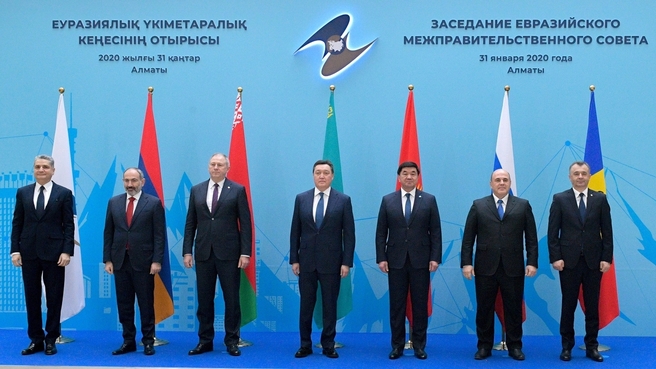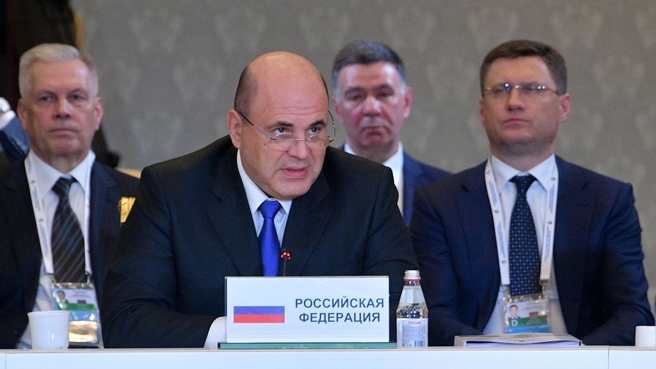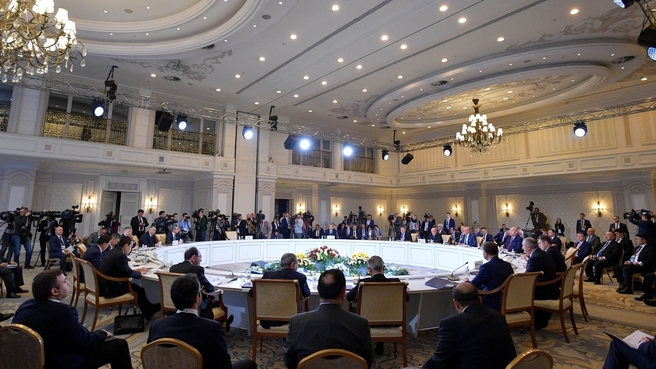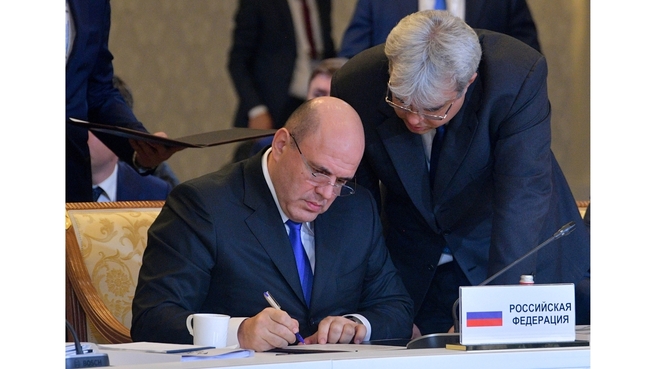Under discussion were current issues of the Eurasian Economic Union activities and the further improvement of its legal base.
Mikhail Mishustin’s remarks at the meeting
List of delegation heads attending the meeting of the Eurasian Intergovernmental Council:
Prime Minister of the Republic of Armenia Nikol Pashinyan;
Prime Minister of the Republic of Belarus Sergei Roumas;
Prime Minister of the Republic of Kazakhstan Askar Mamin;
Prime Minister of the Kyrgyz Republic Mukhammedkalyi Abylgaziev;
Prime Minister of the Russian Federation Mikhail Mishustin;
Chair of the Board of the Eurasian Economic Commission Tigran Sargsyan;
Prime Minister of the Republic of Moldova Ion Chicu.
Mikhail Mishustin’s remarks at the meeting:
I would like to convey my greetings to all the participants in this expanded Eurasian Intergovernmental Council meeting. First of all, I would like to thank our colleagues from Kazakhstan, and Mr Mamin personally for the marvellous arrangements for our meeting, and for creating a very productive environment in Almaty. A big thank you also for your congratulations.
I am attending the Eurasian Intergovernmental Council meeting for the first time as Prime Minister. Let me assure you of Russia’s commitment to further strengthening the union and creating all the required conditions for achieving this goal.
Overall, we have a positive view of how Eurasian integration has been advancing in all the key areas. First and foremost, operations within the common market have been improving, and supra-national regulations are becoming increasingly more effective. Our target is to ensure that all the five economies grow and that people in the union feel the benefits of being part of a common space and have equal opportunities.
Let me say a few words about the results that we have already achieved within the union.
In the first three quarters of 2019 the union’s aggregate GDP growth rate was equal to 1.4 percent, while manufacturing and agriculture grew 2.7 percent.
We are witnessing positive shifts in terms of exports within the union. The share of vehicles, equipment and means of transport reached 20 percent. The range of goods available on the union’s internal market is increasing, offering our manufacturers new opportunities for promoting their wares.
The Pension Agreement for EAEU Working Population has entered into force, as has already been mentioned. It guarantees the right to pensions for citizens from all the five countries regardless of where they worked within the union. Millions of people are covered by this measure. There was another landmark decision. Ticket prices for visiting museums or other cultural facilities will now be the same for all EAEU citizens in all countries of the union. In fact, it now seems odd that they were treated as foreigners when buying tickets to visit exhibitions and performances.
What should be our short-term priorities?
The first goal is to remove any barriers for accessing the EAEU market and to promote a competitive business environment. We realise that this would require extensive efforts, compromises and being able to address challenging issues in a constructive manner. Belarus as this year’s chair designated this matter as a priority. This decision has our support.
Visit
-
Mikhail Mishustin's meeting with first President of the Republic of Kazakhstan Nursultan Nazarbayev
-
Mikhail Mishustin's meeting with President of Kazakhstan Kassym-Jomart Tokayev
-
Mikhail Mishustin’s meeting with Prime Minister of Moldova Ion Chicu
-
Mikhail Mishustin’s meeting with Prime minister of Belarus Sergei Roumas
-
Mikhail Mishustin’s meeting with Prime Minister of Armenia Nikol Pashinyan
-
Mikhail Mishustin’s meeting with Prime Minister of Kazakhstan Askar Mamin
Ensuring the traceability and labelling of goods
provides a mechanism for improving the transparency of the common market.
Russia proposed expanding this measure to more goods. Let me remind you that we accommodated our colleagues
and postponed the implementation timeframe for marking footwear in Russia until
1 March 2020. Colleagues, I would like to ask you to accelerate procedures for
enacting this initiative and joining this project that has so much importance
for the common market.
The second priority is to promote the digital transformation of our economies, which opens up game-changing opportunities in various spheres. This is what the forum that is taking place today in Almaty is all about. Let me note that we have been quite successful in promoting digital transformation. The Commission and our partners within the union reviewed about 70 initiatives and launched the first digital projects in manufacturing, transport and the labour market. We hope that digital technology competence centres will be created in the near future, as I have already said in my remarks at the forum. This will enhance the efficiency of our digital cooperation.
A plan was developed for building an ecosystem of digital transit corridors. It will reduce the times of passenger and cargo operations across the EAEU, making this type of transit more in-demand and competitive. We also need to be more proactive in fine-tuning digital cooperation on phytosanitary and veterinary affairs by creating a single system for tracking the movement of goods and cargo subject to quarantine and veterinary control. We are about to finalise veterinary certification procedures with our Belarusian colleagues, and launched a similar process with Kazakhstan regarding goods subject to quarantine. By combining our efforts we can prevent the circulation of low-quality products and make our controls more effective.
Third, there must be no delays in carrying out a major project to establish a Eurasian Network for Industrial Cooperation, Subcontracting and Technology Transfers. We will decide today on updating the project’s timeframe and funding provisions. The network is expected to be up and running next year.
The fourth priority concerns international cooperation. In October, the EAEU signed free trade agreements with Singapore and Serbia, the trade liberalisation agreement with Iran came into force, and the Agreement on Trade and Economic Cooperation between the EAEU and China took effect, which of course is critical for ensuring connectivity between the EAEU and China’s Belt and Road Initiative. We expect to make serious progress in our negotiations on setting up free trade areas with Egypt and Israel, and will also begin talks with India on liberalising trade flows. Strengthening cooperation between the EAEU and the CIS remains a priority. In this context, we welcome the interest expressed by Uzbekistan in establishing ties with the EAEU.
My fifth point is that the union’s development objectives must correlate with the interests of the people. Russia put special emphasis on healthcare, education, research, social rights, environmental protection, sports and tourism when drafting the strategic documents for the union. We have already made proposals to this effect, and hope that you will support our initiatives.
Colleagues, in conclusion, I would like to wish Mr Sargsyan a happy birthday, and thank him for his work as Chairman of the Eurasian Economic Commission Board. I worked with him very closely in my previous position. I wish you good health and every success in your future undertakings. I would like to inform you that following this meeting he will receive the Stolypin Medal, 1st Class. I hope that I will be the one to present the medal.
Documents signed following the Eurasian Intergovernmental Council meeting:
· Directive on the work to eliminate barriers on the internal market of the Eurasian Economic Union by the member states of the Eurasian Economic Union
· Instruction on drafting a document outlining strategic areas of the development of Eurasian economic integration until 2025
· Instruction on organising events to increase awareness of representatives of government agencies and development institutions working on matters related to Eurasian economic integration, business leaders from the member states of the Eurasian Economic Union, and officials and employees of the Eurasian Economic Commission
· Instruction on implementing Instruction No. 11 of the Eurasian Intergovernmental Council of 25 October 2019
· Instruction on implementing Instruction No. 17 of the Eurasian Intergovernmental Council of 27 November 2018
· Instruction on implementing Instruction No. 6 of the Eurasian Intergovernmental Council of 30 April 2019
· Instruction on the results of the development of proposals related to detailing the approaches to regulating duty-free imports of goods for personal use purchased by an individual as part of international electronic trade
· Instruction on improving mechanisms for using special protective, anti-dumping and compensatory measures in the Eurasian Economic Union with regard to international rules and practices, including the experience of the European Union
· Directive on forming an ecosystem of digital transit corridors in the Eurasian Economic Union
· Decision on amending certain decisions of the Eurasian Intergovernmental Council
· Directive on the time and venue for holding the next meeting of the Eurasian Intergovernmental Council
· Directive on submitting a candidate for the Eurasian Economic Commission Council to the Supreme Eurasian Economic Council
· Directive on submitting a candidate for the Eurasian Economic Commission Board to the Supreme Eurasian Economic Council.















